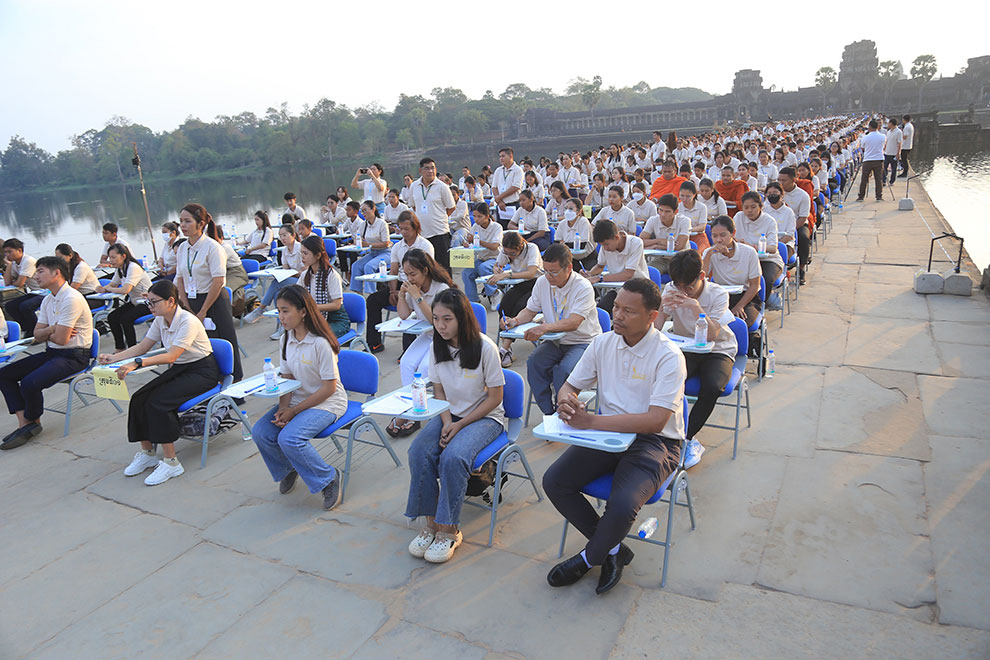
The first edition: Winner Cheng Ratana (centre), runner-up Vorn Vida (left) and third placed Yob Sokhek received their prizes on January 21, 2024. Post staff
The Angkor Writing Contest, the Kingdom’s premier Khmer dictation competition, is back for its second edition, promising another memorable celebration of Cambodia’s rich literary heritage.
Scheduled to take place on January 19 on the western causeway of the iconic Angkor Wat Temple, the contest will once again showcase the nation's devotion to preserving and promoting the Khmer language.
“We are proud to share that the oldest applicant is 81 years old, while the youngest is just six,” said Lim Bun Hok, secretary of state at the Ministry of Foreign Affairs and International Cooperation, which is organising the event.
“This remarkable range reflects the inclusivity and appeal of Khmer literature to all,” he added.
The inaugural competition in 2024 set a high bar, with Cheng Ratana emerging victorious as the first-ever winner.
Now 29 years old, Ratana impressed both judges and spectators by making only two spelling mistakes in his dictation.
His prize included free flights from Phnom Penh to Thailand, a luxury hotel package, a cash prize of 1.2 million riel ($300) and a stunning gold-plated trophy.
Bunhok highlighted Ratana’s remarkable achievement, pointing out that despite the competition's challenging nature, he made only minimal errors.
Ratana’s success was especially notable, given that the event attracted over 700 participants, aged seven to 67.
The competition, themed “Angkor Khmer Civilisation,” resonated deeply with Cambodians of all ages, further cementing the importance of Khmer literature in the Kingdom’s cultural fabric.
As anticipation builds for the second competition, Ratana shared some thoughts with this year’s participants.

The 2025 contest, themed ‘Angkor Writing’, is restricted to 1,200 participants. Post staff
“From a young age, I’ve loved Khmer literature. It’s been a part of me since elementary school,” Ratana reflected, explaining that his deep passion for the language continued into his high school years, where he was recognised with an outstanding student award in 2012.
His academic pursuits led him to study law at the Royal University of Law and Economics, but his love for writing never wavered.
He has since become a writer, crafting short stories, novels, poems and even movie scripts.
Ratana’s advice for his fellow contestants was simple.
“Stay calm and focused. The dictation may be challenging, but it’s important to listen carefully and write quickly,” he explained, while stressing the importance of staying flexible and not succumbing to pressure.
“While I don’t have high expectations for the competition, I enjoy participating and doing my best,” Ratana told The Post.
“Whether the number of participants is big or small, each competitor should concentrate on accuracy, neatness and writing to the best of their ability,” he continued.
Ratana’s dedication to his craft is reflected in his habits. He is a frequent reader, a practice he believes helps improve both his memory and vocabulary.
He also consults authoritative sources such as the Samdech Sangha Chuon Nat Dictionary and the National Council of Khmer Language for guidance.
In this year’s competition, participants will be divided into two groups: Group 1, for those aged 18 and younger, and Group 2, for participants aged 19 and above.
This change aims to further enhance inclusivity, ensuring that all who are confident in their Khmer writing skills have an opportunity to compete.
This year’s theme, “Angkor Writing,” is expected to draw even more attention to the cultural and historical significance of the Khmer language and attract a record number of participants.
The contest will be limited to 1,200 competitors, ensuring a smooth and efficient event experience.
The contest underscores the importance of the Khmer alphabet and its preservation. Participants include students, professionals and retirees, all united in their passion for Khmer spelling and grammar.
“Each individual becomes an ambassador of our shared literary heritage,” said Bun Hok.















